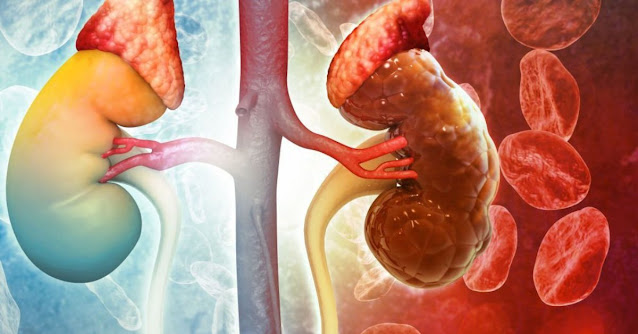At some point in our lives, we may have heard of the term "chronic kidney failure." But what exactly is it? In this article, we will discuss the causes, symptoms, and treatments of chronic kidney failure in detail.
What is Chronic Kidney Failure?
Chronic kidney failure, also known as chronic kidney disease (CKD), is a long-term condition that affects the kidneys' ability to filter waste products from the blood. Over time, the kidneys lose their ability to function properly, leading to a buildup of waste products and fluid in the body. This can cause various health complications, such as high blood pressure, anemia, and bone disease.
There are several causes of chronic kidney failure, including:
Diabetes - High blood sugar levels can damage the blood vessels in the kidneys, leading to kidney damage over time.
High Blood Pressure - High blood pressure can cause damage to the blood vessels in the kidneys, reducing their ability to function properly.
Glomerulonephritis - This is a condition where the small blood vessels in the kidneys become inflamed and damaged.
Polycystic Kidney Disease - A genetic condition that causes cysts to form in the kidneys, leading to kidney damage over time.
Kidney Stones - These are hard, mineral deposits that can form in the kidneys and cause damage over time.
Symptoms of Chronic Kidney Failure
The symptoms of chronic kidney failure can be quite subtle in the early stages of the disease. The following signs may manifest as the condition worsens:
- Fatigue and weakness
- Loss of appetite
- Nausea and vomiting
- Swelling in the legs and ankles
- Itching and dry skin
- Muscle cramps
- Difficulty sleeping
- Changes in urine output
Treatments for Chronic Kidney Failure
The treatment for chronic kidney failure depends on the severity of the disease and the underlying cause. Some treatments may include:
Medications - Medications may be prescribed to control blood pressure, lower cholesterol levels, and reduce inflammation in the kidneys.
Diet Changes - A dietitian may recommend changes to your diet to help manage the symptoms of chronic kidney failure. This may include reducing sodium intake, limiting protein intake, and avoiding foods that are high in potassium.
Dialysis - Dialysis is a medical procedure that helps to remove waste products from the blood when the kidneys are no longer able to do so. Hemodialysis and peritoneal dialysis are the two forms of dialysis.
Kidney Transplant - In some cases, a kidney transplant may be necessary to treat chronic kidney failure. This involves transplanting a healthy kidney from a donor into the patient's body.
Chronic Kidney Failure: Frequently Asked Questions
Chronic kidney failure, also known as chronic kidney disease (CKD), can be a complex condition to understand. Here are some frequently asked questions about chronic kidney failure:
Q: What are the early signs of chronic kidney failure?
A: In the early stages of chronic kidney failure, there may be no visible signs or symptoms. As the disease progresses, some early signs may include fatigue, weakness, loss of appetite, and changes in urine output.
Q: Can chronic kidney failure be cured?
A: Unfortunately, chronic kidney failure cannot be cured. However, with proper management and treatment, the progression of the disease can be slowed, and complications can be prevented.
Q: What are the risk factors for chronic kidney failure?
A: The risk factors for chronic kidney failure include diabetes, high blood pressure, family history of kidney disease, obesity, smoking, and older age.
Q: What are the treatment options for chronic kidney failure?
A: The treatment options for chronic kidney failure depend on the severity of the disease and the underlying cause. Treatment options may include medications, diet changes, dialysis, or kidney transplant.
Q: How can I prevent chronic kidney failure?
A: To prevent chronic kidney failure, it is important to manage the risk factors for the disease, such as controlling blood sugar levels, managing high blood pressure, maintaining a healthy weight, and avoiding smoking.
Q: Can chronic kidney failure be fatal?
A: If left untreated, chronic kidney failure can be fatal. However, with proper management and treatment, complications can be prevented, and the progression of the disease can be slowed.
Q: How often should I get tested for chronic kidney failure?
A: If you are at risk for chronic kidney failure, it is recommended that you get tested regularly. Talk to your healthcare provider about how often you should get tested.
Q: What are the long-term complications of chronic kidney failure?
A: The long-term complications of chronic kidney failure can include high blood pressure, anemia, bone disease, nerve damage, and cardiovascular disease.
Final Thoughts
Chronic kidney failure can be a challenging condition to manage, but with proper treatment and management, complications can be prevented, and the progression of the disease can be slowed. If you have any questions or concerns about chronic kidney failure, talk to your healthcare provider for chronic kidney failure.
Are you or a loved one in need of chronic kidney failure treatment? Don't hesitate to seek help from a qualified healthcare provider. With proper management and treatment, the progression of the disease can be slowed, and complications can be prevented. At our medical center in Coimbatore, we offer comprehensive care for patients with chronic kidney failure. Our team of experienced healthcare providers will work with you to develop a personalized treatment plan that meets your individual needs. If you're looking for effective and compassionate chronic kidney failure treatment in Coimbatore, contact us today to schedule a consultation. We're here to help you live your best life with chronic kidney failure.







0 Comments